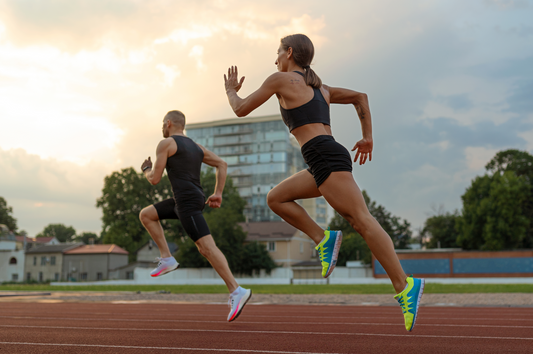Caffeine is one of the most widely used (and studied) performance enhancers in the world. From your morning coffee to pre-race gels, it’s everywhere, but how does it actually affect endurance athletes? Is it really a boost, or could it backfire?
Let’s break it down.
☕ How Caffeine Works in the Body
-
Caffeine isn’t just about waking you up in the morning. It interacts with your brain, nervous system, and muscles in ways that can directly impact endurance performance. The key to its effectiveness lies in how it alters fatigue perception, energy use, and focus during prolonged exercise.
-
The first major effect happens in the brain. Normally, as you train or race, a chemical called adenosine builds up and binds to receptors, making you feel tired and less alert. Caffeine works by blocking these adenosine receptors. With adenosine unable to do its job, the brain doesn’t register fatigue as strongly. This means your workout feels easier at the same pace, lowering your Rate of Perceived Exertion, a huge advantage during long events.
-
At the same time, caffeine stimulates the central nervous system by increasing levels of dopamine and norepinephrine, two neurotransmitters linked to motivation, alertness, and reaction time. This effect is why many athletes report sharper focus, better decision-making, and a more “switched on” feeling during competition. In endurance sports where mental fatigue can be as limiting as physical fatigue, this neurological boost is critical.
-
Caffeine also influences how your muscles use energy. By stimulating the release of epinephrine (adrenaline), it promotes the breakdown of fat stores into usable free fatty acids. This process, called lipolysis, allows muscles to tap into fat as an additional energy source. The benefit here is glycogen sparing, your body conserves its limited carbohydrate stores for later in the race, delaying the dreaded “bonk.”
-
There is also evidence that caffeine can improve muscle contractility. Inside muscle cells, caffeine helps release calcium more effectively, allowing muscle fibers to contract with greater force and efficiency. While this effect is subtle, it may explain why athletes often experience stronger surges, better climbing, or sharper finishing sprints after a caffeine dose.
-
Finally, caffeine has been shown to influence endorphin levels, which play a role in pain perception. Higher endorphins can make hard efforts feel more manageable, allowing athletes to push deeper into discomfort before backing off. This is particularly useful in the final stages of a marathon, long ride, or triathlon when both the body and mind are under heavy stress.
-
In summary, caffeine doesn’t give you energy in the way carbohydrates do, it doesn’t add fuel. Instead, it reshapes how your body and brain handle effort, fatigue, and energy reserves. The combined effects less perceived fatigue, better focus, greater glycogen conservation, stronger contractions, and reduced pain, explain why caffeine is considered one of the most effective legal performance enhancers in endurance sports.
⚡ Proven Benefits for Endurance Athletes
The performance-enhancing effects of caffeine have been studied for decades, and the evidence is remarkably consistent: when used correctly, caffeine gives endurance athletes a measurable edge. Even small improvements, often in the range of 2–4% can make the difference between hitting a personal best, securing a podium spot, or simply finishing strong instead of fading in the final stretch.
One of the most significant benefits is delayed fatigue. Because caffeine lowers your perception of effort, long workouts and races feel less demanding at the same pace. In practice, this means you can maintain your race intensity for longer before the mental and physical strain forces you to slow down. Marathoners, cyclists, and triathletes often report that caffeine helps them push through the “dark moments” late in competition, when the body’s natural response is to back off.
Another proven advantage is increased power output and endurance capacity. Studies on cyclists have shown that athletes supplemented with caffeine can produce higher wattage for extended periods, and runners have demonstrated faster time-trial performances after caffeine intake. This boost is particularly noticeable during high-intensity segments such as climbing, sprinting, or finishing kicks, where every extra bit of output matters.
Caffeine also provides a strong mental benefit. Endurance events are as much about focus and decision-making as they are about physical strength. Caffeine enhances concentration, sharpens reaction times, and keeps athletes mentally engaged even after hours of exertion. In disciplines like triathlon or road cycling, where strategy and situational awareness can decide outcomes, staying mentally sharp is a hidden but powerful advantage.
Beyond physical and mental performance, caffeine contributes to fuel efficiency. By promoting fat metabolism and sparing glycogen stores, athletes can stretch their energy reserves further. This is particularly valuable in ultra-endurance events where carbohydrate availability is limited, and any delay in glycogen depletion can help avoid the dreaded “bonk.”
In short, caffeine isn’t just about feeling more awake, it has a well-documented ability to help athletes go longer, go harder, and stay sharper. Whether it’s keeping you steady during a marathon, powering you up the last climb of a century ride, or sharpening your mind through the final miles of an Ironman, caffeine has earned its reputation as one of the most effective legal ergogenic aids in endurance sports.
⚠️ The Potential Downsides
Caffeine isn’t risk-free. Too much can backfire:
-
GI issues: High doses may cause stomach upset mid-race.
-
Sleep disruption: Using caffeine late in the day can hurt recovery.
-
Jitters & anxiety: Especially in athletes sensitive to stimulants.
-
Diuretic effect (mild): Not dangerous if hydrated, but worth noting.
🔬 How Much Is Optimal?
Most studies suggest:
-
3–6 mg per kg of bodyweight → effective range for performance.
-
For a 70 kg athlete → that’s ~210–420 mg of caffeine.
-
More than 9 mg/kg doesn’t improve results — it only increases side effects.
⚠️ Tolerance matters: if you’re a daily coffee drinker, your body may need a slightly higher dose to see a noticeable effect.
🕒 Timing Your Caffeine
-
Pre-race: Take caffeine 30–60 minutes before starting.
-
During race: Smaller top-ups (25–100 mg in gels, chews, or drinks) every 60–90 minutes help maintain levels.
-
Post-race: Avoid caffeine late if recovery sleep is a priority.
Best Caffeine Products for Endurance Athletes
Unlike coffee, sports nutrition products deliver controlled doses designed for racing.
-
Energy gels with caffeine (e.g., SiS, Maurten, GU, KMC).
-
Caffeinated electrolyte mixes for hydration + energy.
-
Chews & tablets for precise mid-race boosts.
👉 You can explore Triforge’s caffeinated products collection to find the right option for your training and racing strategy.
Final Verdict: Boost
For most endurance athletes, caffeine is a safe, effective, and proven performance enhancer when used strategically.
It’s not a magic bullet, you still need proper fueling and hydration, but in the right dose, it can be the difference between fading in the last 10K… or finishing strong.



